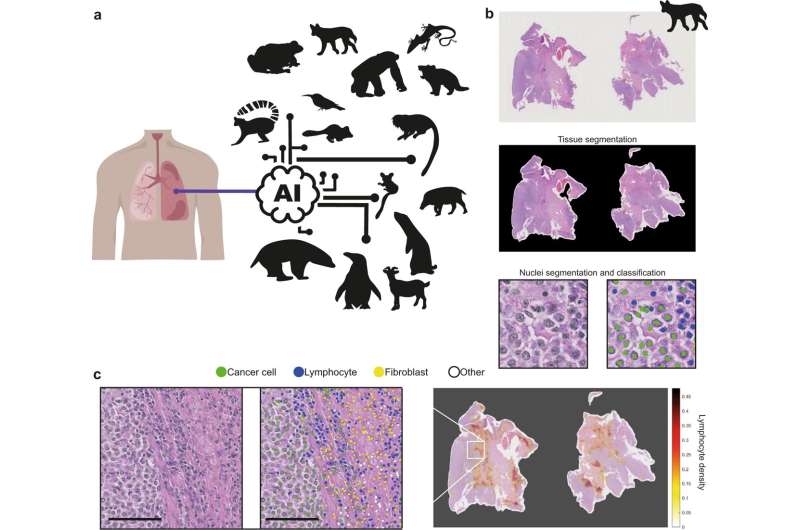This article has been reviewed according to Science X's editorial process and policies. Editors have highlighted the following attributes while ensuring the content's credibility:
fact-checked
peer-reviewed publication
trusted source
proofread
Animal kingdom–wide AI tool could help unravel cancer complexity

An international study has accurately categorized tumor and immune cells of non-human animal species by applying an artificial intelligence (AI) algorithm that was trained on human lung cancer samples.
The study, led by scientists at The Institute of Cancer Research, London, which is the first of its kind, bridges human clinical and wildlife care and could be used to better understand how cancer develops and evolves in people. It shows how AI could open new avenues for human cancer treatment by giving us a greater understanding of the evolutionary similarities and differences between species. The research is published in Nature Communications.
Cancers occur across human and non-human species, and the study of cancer across species, known as comparative oncology, brings huge potential advances for cancer research.
The knowledge gained by understanding why some species have evolved highly effective mechanisms that protect the body from cancer could provide new insights in cancer biology, which could highlight similar mechanisms that could be exploited for the treatment of cancer in people.
The researchers applied an algorithm trained on human lung tumor samples to identify and classify individual lymphocytes, stromal and tumor cells in 120 tumor samples across 20 animal species taken from multiple sites, including the Zoological Society of London, which manages London Zoo and Whipsnade Zoo, The University of Cambridge and two international collaborators from The University of Turin, Italy and The University of Queensland, Australia.
Scientists tested the algorithm's performance by comparing its predictions with 14,570 annotations from two expert veterinary pathologists.
Across-species cancer study
The algorithm was able to distinguish cancer cells across the species tested, with a particularly high accuracy of 94% for canine transmissible venereal tumor and 88% for Tasmanian devil facial tumor disease.
The similar characteristics of these cancer cells to human lung cancer, including nuclei shape, size, and coloration, allows the AI to identify the cancer cells of different species with high accuracy.
A greater understanding of the conserved features and differences in cancer tumors across species could help to answer fundamental questions on how cancer develops and evolves.
The understanding of cancer in animals and its similarity in humans is also crucial for selecting the right animal models for studying human diseases and in the preclinical development of drugs.
The researchers will now apply their algorithm to even more species, with the hope of unraveling how some species are better at suppressing the development of cancer than others, with the hope to use this information to inform how we treat cancer in people.
Answering fundamental questions in cancer biology
Study co-lead, Dr. Khalid Abdul Jabbar, former Postdoctoral Training Fellow in Computational Pathology and Integrative Genomics at The Institute of Cancer Research London, said, "Although our deep learning model was trained on human samples, it was able to distinguish three major cell types with high accuracy in many animal species, due to the similar characteristics of these cell types across the animal kingdom.
"We hope that our model will be used to identify other such similarities and differences across species to help address fundamental questions in cancer biology, improving our understanding of how cancer develops and evolves."
Study co-lead, Dr. Simon Castillo, Postdoctoral Training Fellow in Computational Pathology and Integrative Genomics at The Institute of Cancer Research, London, said, "Cancers occur across human and non-human animal species and our study has highlighted the importance of considering animals in our understanding and treatment of cancer. For example, the understanding of cancer in animals such as mice, which are used in research, is crucial for the selection of the right experimental model animals for human diseases and the preclinical development of drugs. Cross-species comparisons can also help to address fundamental questions in cancer biology and evolution, which could be translated into new therapeutic approaches in people."
'One Health' cancer approach
Professor Yinyin Yuan, Director of the Computational Pathology Research Program at The University of Texas MD Anderson Cancer Center, U.S., who previously oversaw the research as Team Leader in Computational Pathology and Integrative Genomics at the Institute of Cancer Research, London, said, "The health of humans, non-human animals, and our shared environment are closely intertwined, as we have seen through the emergence of recent epidemics.
"Our study helps to bridge the gap between human clinical care and wildlife care, shifting our thinking of healthcare to encompass all species in a 'One Health' approach. This could not only provide answers to key evolutionary questions, such as why some species have higher rates of cancer than others, but also has significant implications for advancing human health care, animal welfare, and wildlife conservation."
More information: Khalid AbdulJabbar et al, Bridging clinic and wildlife care with AI-powered pan-species computational pathology, Nature Communications (2023). DOI: 10.1038/s41467-023-37879-x





















